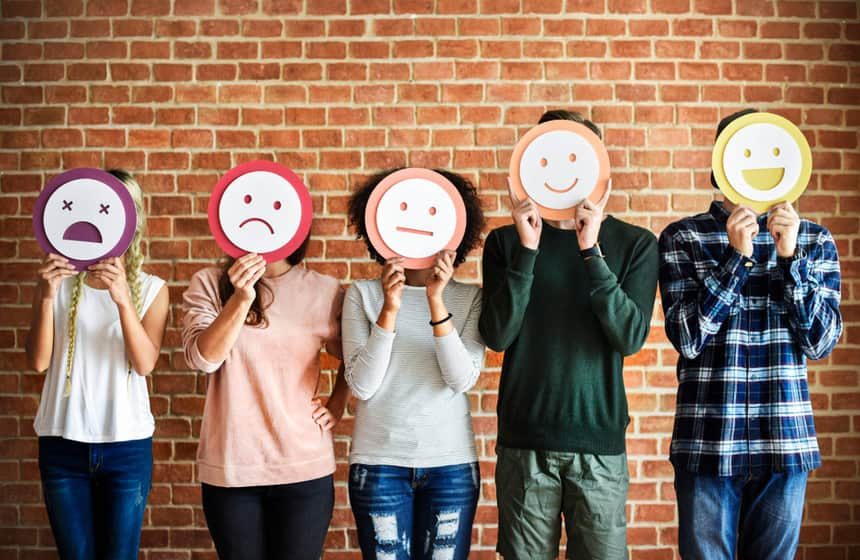Emotional Intelligence: How It Helps, Tips To Develop
Intelligence is a person’s general mental ability which is used to think, feel and act in a certain manner. Feelings, emotions are an integral part of you and these can be internalised or externalised. Some of you may be very expressive in showing your emotions and within the right context. This kind of reasonable emotional response is healthy.

What happens in the case of people who are hyper-sensitive and react with emotional volatility most of the time? Reactions like low frustration tolerance, screaming, stomping and crying incessantly can play havoc with your well-being. Hence, it is imperative to understand emotions and manage them intelligently.
What Are Emotions?
A mental reaction to your subjective (personal) experience is known as an emotion.
- Emotion is usually intense and directed towards a definite stimulus, which can be a person, an object or any event. For instance, you feel joyed seeing your friend. Here, seeing your friend is the stimulus and joy is the emotion.
- Emotions are accompanied by physiological changes in your body such as an increasing heart rate, flushed cheeks, trembling hands, sweating, headache etc.
- Behavioural changes in the emotional state of a person could be withdrawal, aggression, tearfulness, impulsivity, sleeplessness etc.
- Emotions are far more deep-rooted than feelings in a person. Feelings are usually transitory, vary in their intensity and get processed comfortably.
Identifying and regulating your emotions plays a big role in your interpersonal relationships, professional success or failures, happiness and contentment.
 Identifying And Regulating Your Emotions Plays A Big Role In Your Interpersonal Relationships
Identifying And Regulating Your Emotions Plays A Big Role In Your Interpersonal Relationships
Types Of Emotions
Psychologist Paul Eckman in the 1970s identified six basic emotions which are experienced universally, across cultures, namely, happiness; sadness; disgust; fear; anger; surprise.
Emotions are usually associated with a sense of reward, punishment and stress. You experience emotions along a gradient generally. Happiness is an emotion which everyone strives for the most. Fear, being a powerful emotion, plays a significant role in your safety and survival. Anger can lead to hostility, aggression and impulsivity with negative outcomes for a person.
Regulating Emotions
Your daily life comprises some routine, familiarity, and a kind of monotony usually. But what happens when it throws a curveball at you which may be totally unforeseen, unknown or beyond your comfort zone? This is the time when emotions can overwhelm you and start impacting your personal, social, professional life in an unhealthy way.
Defining Emotional Regulation
‘Emotional regulation’ basically implies your ability to effectively respond and manage an emotional experience. Some of the strongly distressing experiences can be – loss of a dear one; relocation to a new place; financial setback; marriage of your children; retirement, etc. Positive experiences, too, evoke significant emotions in us. So if you look at them as a spectrum, emotions are felt at varying degrees of intensity and signal rewards and threats. This very fact drives your behaviour too, wherein you become avoidant, passive or aggressive, outgoing, impulsive etc.
Why Is It Important?
Here is why emotional regulation is an important skill to possess:-
- Empowers you to filter out information in a clear-headed manner, relying on logic (head) instead of heart only (feelings).
- Aids in responding in a calm manner without evoking stress or fear; builds up a sense of self-confidence and resilience in a person.
Tips To Regulate Emotions Better
Now that we’ve got a clear understanding of what emotional regulation is and why it is an imporant trait to have, let us discuss a few tips that can help you regulate your emotions better.
Ask Yourself | Notice closely what you’re feeling and try naming the feeling. For example, “I am feeling bad” is a rather general description of a feeling or an emotion. Instead, try finding the exact word – “am I feeling sad, anxious, hapless, ashamed, or guilty?” Asking yourself is the first step towards self-awareness and regulation.
Reappraise Your Thoughts | Note your self-talk. Analyse your words as to how true they actually are. Substitute them with an alternative. Rephrase your thoughts. For example – “My teacher/boss hates me” can be replaced by, “My teacher/boss is upset at this moment”, “I am diligent and honest”.
Practice Mindfulness | Mindfulness helps in being aware of your physical body, and the environment around you. It aids in identifying the sensations that you are going through and also the external world that is swarming with stimulants. It facilitates exploration of triggers, soothers around you, and an appropriate response.
 Mindfulness Helps In Being Aware Of Your Physical Body
Mindfulness Helps In Being Aware Of Your Physical Body
Be Flexible | Adaptability strengthens your emotional regulation. Inculcating openness and flexibility in your attitude helps in coping positively with changes in life. Instead of getting stuck in a rut of rigid thinking (“My way or the highway!”), try seeing things from another angle or perspective.
Be Kind | Kindness towards self and others builds relationships. Stop underrating yourself or criticising others. You are not perfect and neither are they. Take some “me-time” out on a daily basis. Relax, introspect, and acknowledge your strengths.
Learn From Experiences | Experiential learning guides you to focus on what you learned from a conflict and gaining a new perspective. You learn not to make the same mistakes again, for example by retorting rudely, or yelling at the top of your voice when feeling insulted by someone. This way you learn to save yourself from stress and agony and empower yourself in handling negative encounters.
H.A.L.T | Use the acronym H.A.L.T (hungry, angry, lonely, or tired) in identifying your volatile responses. Stop and consider if you are hungry, angry, lonely, or tired, and take action accordingly.
Use Positive Affirmations | Positive self-talk helps in substituting negative words or thoughts with positive ones. This helps in better emotional regulation. For example the statement “I messed up again!” can be substituted with a positive self-affirmation like, “It’s not the end of the world!” or “I need to try harder”.
Seek Help | Approach a therapist if you are not able to manage your emotions well. A therapist can help you with skills training for emotional regulation.
Emotions cannot be dusted away or swept under the carpet. They need to be faced, understood, and regulated for optimal well-being. Be emotionally intelligent from now onwards and walk the road of life with gratitude, grace, and giving.
Sanjana Seth is a Psychologist and Psychotherapist, registered with RCI, and holds more than two decades of practising experience with the healthcare organisations of the Armed Forces, as well as those operating as private. Mother to two adults, Sanjana has worked extensively for children with special needs and taught Psychology to students at undergraduate and postgraduate levels.
Applications for Admissions are open.
As per latest syllabus. Physics formulas, equations, & laws of class 11 & 12th chapters
JEE Main Important Chemistry formulas
Get nowAs per latest syllabus. Chemistry formulas, equations, & laws of class 11 & 12th chapters
JEE Main high scoring chapters and topics
Get nowAs per latest 2024 syllabus. Study 40% syllabus and score upto 100% marks in JEE
JEE Main Important Mathematics Formulas
Get nowAs per latest syllabus. Maths formulas, equations, & theorems of class 11 & 12th chapters
